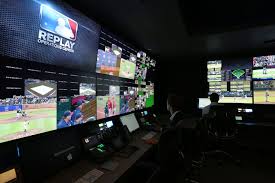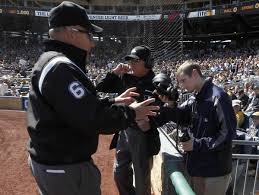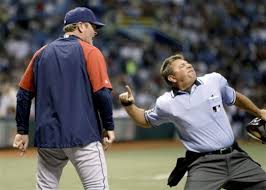Are IP Cameras part of Major League Baseball’s expanded replay review? It seems like I was just counting the days until Pitchers and Catchers would be reporting to spring training. It would be a promise that the end of the horrendous winter of 2014, and its polar vortex would be coming to an end. Now, all of a sudden, we’re halfway through the 2014 baseball season!
As usual, time flies, although that might be a point of discussion when it comes to the flow of some games. Yes, baseball is a leisurely sport, and it just may have gotten a tad slower – or not. It all depends on how the new expanded replay review rule affects the pace.
Commissioner Bud Selig, in announcing its approval at the January owners’ meetings, had this to say.
“This is really big. I’m proud of the changes we’ve made….. because they won’t disturb the game as we know it…..Yes, there will be some differences, but because of our own technology, we’ve been able to do this.”
IP Technology?
Our own technology? This piqued my curiosity. Are they using IP camera systems? It sure would seem so, but since MLB is tightly closed mouth on exactly what technology they’ve employed, we can’t say for sure. What we can say is that MLB put a lot of muscle and manpower into setting up the video camera systems in time for opening day. Consider these numbers:
32,178 person-hours and 682,788 person miles went into shipping and installing 42 tons of equipment at 30 ballparks, and running 172.14 miles of cable. And don’t forget that back in New York City at the operations center, 37 HD monitors had to be mounted.
So How Does it Work?
Each manager starts a game with one allowed challenge. If it’s upheld, he retains the right to another challenge. If it’s overturned he’s out of challenges. This limit on the number of challenges is intended to keep the rhythm of the game going. But there are a lot of instances that are challenge-allowable – (like 90% of all plays!) – including
- home runs
- ground-rule doubles
- boundary calls
- plays at first base
- force, tag, and trap plays
Each manager is able to dispute a call by requesting a video review. How does he do this? He must “verbally inform the umpire in a timely manner.” (Hmm!)
So How Does it Really Work
To ensure impartiality, the umpires on the field do not review the videos and make the calls. This is carried out in the 900 square foot replay operations center in New York City on the top floor of a former Nabisco factory, now the fashionable Chelsea Market.

Current MLB umpires rotate through duty there, reviewing video feeds. In order to fill the need for manpower, two additional four-man umpire crews had to be hired. In the interest of uniformity, cameras have been mounted at the same twelve angles at each ballpark, so no matter which ballpark the video feed is coming from, the ops center umpires always see the play from the same advantage.

Once the review has been completed, the on-field crew chief and at least one of his umpires are called to the designated communications center where the decision whether the replay review umpires have upheld or overturned the manager’s challenge is relayed through hard-wired. The crew chief then relays the news to the team managers.
The Bottom Line
Most team managers have shown a willingness to give it a try. San Franciso Giants manager Bruce Bochy told the Associated Press, “It’s about getting it right, and with our technology today we can do that in a way I don’t think interrupts the flow of the game.”
You have to wonder, though, will baseball be the same? Just as some NASCAR racing fans consider car crashes part of the viewing experience and hockey fans, the fight, some baseball fans eagerly await sometime the comic scenes of the volatile manager’s disputing umpire calls. For instance,


Those fans are in luck. Ball/strike calls are not subject to expanded replay review, and so managers are jumping on them (sometimes literally!) So far, more have been ejected along with players and coaches than this time last year.

But in defense of the impartiality of the video, roughly half of their out/safe calls challenges have been upheld.
One fact that’s never challenged is the expertise Kintronics sales engineers bring to the table in helping customers choose IP camera security systems that best fit their needs. If you’re thinking about installing IP surveillance camera systems, video management software, or paging over internet give us a call at 914-944-3425, or if you prefer, just fill out an information request form.